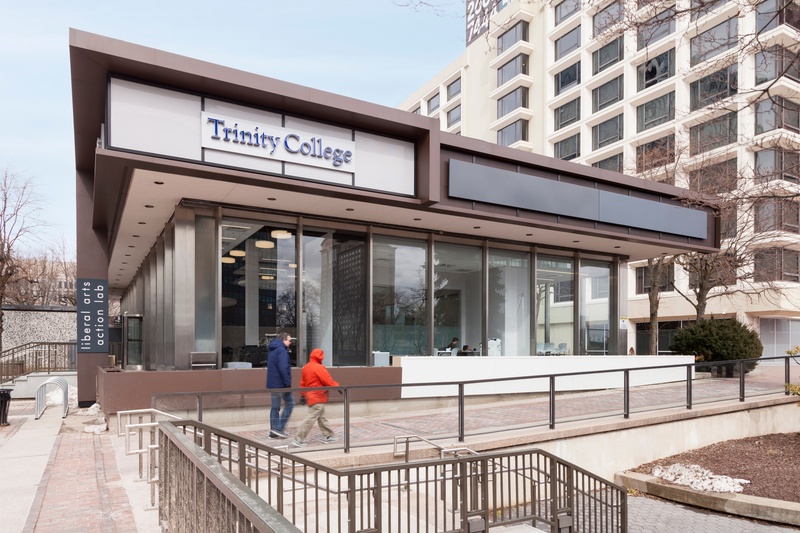Olivia Papp ’23
Features Editor
The Liberal Arts Action Lab is a project which thrives on student and faculty collaboration from both Trinity College and Capital Community College and lasts the length of a full semester. Students apply to the Action Lab each semester and are given the opportunity to enroll in classes which strengthen their research and digital skills. The goal of the Liberal Arts Action Lab is to strengthen the city and its role in the region, create social innovation, uplift civic engagement, and sustainability. This fall, the projects in the Liberal Arts Action Lab are Community Ownership, Frog Hollow Storytelling, Neighborhood Investment, and Energy Efficiency. Each of these Projects are helping to support the surrounding Hartford community in ways that improve the conditions of the community.
The Action Lab is located in downtown Hartford. According to Erica Desmond ’23, a student taking part in the current Liberal Arts Action Lab, “I am working in the neighborhood investment action lab this semester.” This particular lab typically meets on Wednesday evenings from 6:30 to 9 P.M. The Community Partner for this initiative is James Boucher, who serves on the board of Southwest and Behind the Rocks NRZ. Desmond offered that she feels the lab allows students to “have more of a say in the city of Hartford. In the lab, students meet to discuss possible ways that they can impact the local community.”
Desmond also noted that being part of the neighborhood through the Liberal Arts Action Lab has complimented her studies and career goals. As part of the Liberal Arts Action lab, her “job is to study United States census’s, previous statistics, and also conduct interviews with local Hartford residents. After doing this extensive research and data collecting, my group and I makes a comprehensive report which we will then present to our community partner, James Boucher. He will be the person to then present our findings to the local government to hopefully perpetuate change.”
Unfortunately, Hartford is one of the four poorest cities in the United States of America. The city of Hartford suffers daily from food insecurity, unequally funded schools, poor housing, homelessness, all while in such close proximity to thriving towns such as West Hartford.
Desmond detailed the work her group has done to examine the wealth distribution in the surrounding area. “Recently, my group has only done research involving studying statistics and reading articles. As we are studying the change in development and wealth distribution in Hartford, over the past fifty years, these articles and findings are critical for contextualizing some of the issues we see today in Hartford.”
While there are many issues in Hartford that must be addressed, the Hartford education system is a substantial issue that Desmond is passionate about and would like to help solve. As an Education Major, Desmond has “focused a lot on the unequal funding in the school system and the uncertainty of the magnet school lottery.” The city of Hartford has both public schools and magnet schools to try and level the playing field for Hartford local students. Magnet schools tend to be better funded with better resources and better programs. The magnet school lottery selects students to receive the opportunity to go to the magnet school for free.
While there are many different avenues to take with this project, the path which this year’s group settles on will certainly make an impact on the Hartford community, and Desmond hopes that they will “see some investments in the public-school systems, potentially some scholarship programs to help students achieve a college education.”
If interested in participating in the Liberal Arts Action Lab next semester, contact Emily Cummins, the Director of the Liberal Arts Action Lab and Lecturer in Urban Studies whose phone number is 860-297-2556. From there, students will be asked to fill out an application. The Action Lab application consists of a matching process of three to five teams. When teams are selected, the group will start the process by having a community partner pose them a question. The group will have a faculty fellow who will guide anywhere from five to seven students from Capital Community College and Trinity College.






+ There are no comments
Add yours